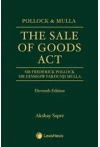- Author(s): Akshay Sapre, Frederick Pollock, Dinshaw Fardunji Mulla
- Publisher: LexisNexis
- Edition: 11 Ed 2021
- ISBN 13 9788195294527
- Approx. Pages 412 + Contents
- Format Hardbound
- Approx. Product Size 24 x 16 cms
- Delivery Time Normally 7-9 working days
- Shipping Charge Extra (see Shopping Cart)
.............................................................................................................................
Description
Since the last edition and the one at hand, two significant legislative developments have taken place. First, The Sale of Goods Act now applies to the Union Territories of Jammu & Kashmir, thereby repealing the Jammu & Kashmir Sale of Goods Act, 1996. This makes the Act uniformly applicable to the whole country. Consequently, the judicial pronouncements rendered under it are also applicable to the newly formed Union Territories. Second legislative development is the enactment of the Consumer Protection Act, 2019, which repeals the earlier Act of 1986. The new Act aims at a complete revamp of the consumer protection regime. The new Act will provide an interesting interplay with Sale of Goods, especially with the introduction of product liability, expansive definition of Goods which include food, and online market places. In Preface to the last edition, a point of concern was raised on the lack of statutory framework for sale and purchase in online market places. With the new Consumer Protection regime, some of it seems to have been addressed. However, the Sale of Goods Act still awaits to see any legislative developments in this regard. Apart from legislative developments, a host of judicial pronouncements have gathered since the last editions. A few interesting ones being on the question of essential requisites of 'sale' in context of Clubs, Indian Supreme Court' following the law laid down by the Queens Bench in Graff v Evans the has held that the rigors of Article 366(29A)(f) of the Constitution does not apply to members club, whether incorporated, or not. Where the activity of Sale and Purchase is happening in different Statues, such as the Central Excise Act, 1944, the Supreme Court has ruled that definitions of one statute cannot be mechanically applied to another which has a different object and purpose. On this line of reasoning, Court has refused to apply the definition of sale under the Sale of Goods Act to that of the Central Excise Act as the scope and ambit of the two statutes is different. While interpreting Section 19 dealing with passing of property in the goods, the Supreme Court has maintained the governing principle that property passes when it is intended to pass, however, with a caveat that the property shall pass when it is capable of being so passed. If there is an impediment in the transfer of property, the transfer can be effected only the impediment is removed.
.............................................................................................................................
Contents
Chapter 1. Preliminary
Chapter 2. Formation of the Contract
Chapter 3. Effects of the Contract
Chapter 4. Performance of the Contract
Chapter 5. Rights of Unpaid Selleragainst the Goods
Chapter 6. Suits for Breach of the Contract
Chapter 7. Miscellaneous
Appendix : Sale of Goods Act 1979
Subject Index
.............................................................................................................................
Author Details
Authors - Pollock & Mulla
Revising Author - Akshay Sapre, Advocate, Supreme Court of India
.............................................................................................................................

